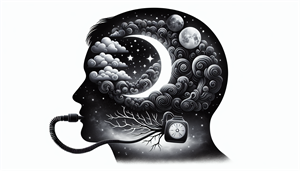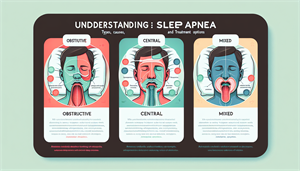
Imagine the feeling of waking up feeling exhausted, even after a full night’s sleep.
For individuals living with sleep apnea, this is a common reality. The condition, known as obstructive sleep apnea and mental health, is a sleep disorder that affects millions of people worldwide.
But did you know that this sleep disorder can also significantly impact mental health? In fact, sleep apnea is intricately linked with several mental health conditions, and understanding this connection is crucial for both diagnosis and treatment.
Key Takeaways
-
Sleep apnea significantly impacts mental health, contributing to mood swings, anxiety, depressive symptoms, and exacerbation of existing mental health disorders.
-
Effective treatment of sleep apnea, such as CPAP therapy and lifestyle changes, can lead to the alleviation of mental health symptoms associated with the condition.
-
Identifying and treating sleep apnea in individuals with psychiatric disorders, including bipolar disorder and PTSD, is crucial for improved mental health outcomes and overall well-being.
The Impact of Sleep Apnea on Mental Health
Sleep apnea, specifically obstructive sleep apnea, is a prevalent sleep disorder characterized by repeated episodes of breathing cessation during sleep. This sleep disordered breathing can lead to sleep deprivation, which in turn can have severe consequences on both physical health and mental health. Indeed, the impact of sleep apnea on mental health is significant and multifaceted.
Sleep apnea patients often experience mood swings, anxiety disorders, and depressive symptoms, which can complicate the diagnosis and treatment of this sleep disorder.
Moreover, untreated sleep apnea can exacerbate existing mental health disorders, thus creating a vicious cycle that negatively affects the overall well-being of affected individuals.
Hence, grasping the link between sleep apnea and mental health paves the way towards enhanced treatment for sleep apnea and improved overall mental health care. This is where sleep medicine, and in particular the j clin sleep med, has an important role to play: by shedding light on the complex relationship between sleep apnea and mental health, it can guide both healthcare professionals and patients towards more effective management strategies.
Depression and Sleep Apnea
One of the most significant links between sleep apnea and mental health is the connection with depression.
Depression is a common psychiatric disorder that affects millions of people worldwide, leading to significant distress and impairment. Numerous studies have found a strong correlation between sleep apnea and major depressive disorder.
Depression is common in sleep apnea patients, with frequencies ranging from 17.6% to 35%. This correlation suggests that the sleep disturbances associated with sleep apnea can significantly contribute to the development and exacerbation of depressive symptoms.
Consequently, sleep apnea patients are at an increased risk of developing depression and other mood disorders. Yet, hope is not lost. Alleviation of depressive symptoms has been observed through successful treatment of sleep apnea. This is a significant finding because it implies that effective sleep apnea treatment can contribute to better mental health outcomes and reduce the burden of depression.
However, the mechanisms connecting obstructive sleep apnea syndrome to depression remain uncertain, and it is unclear whether there are shared pathways linking the two conditions. This uncertainty underscores the need for further research into the connections between sleep apnea and depression.
Despite these hurdles, it is evident that the link between sleep apnea and depression is robust. Hence, identification and remediation of sleep apnea can play a pivotal role in handling depression and boosting overall mental health.
Anxiety and Sleep Apnea
Anxiety is another mental health condition that is closely associated with sleep apnea. Individuals with sleep apnea often experience heightened levels of anxiety, which can be attributed to the stress of dealing with the symptoms of the sleep disorder.
The interrupted sleep patterns and oxygen deprivation that occur with sleep apnea can lead to increased feelings of anxiety and panic. Furthermore, the chronic fatigue and daytime sleepiness that are common in sleep apnea patients can exacerbate anxiety symptoms, leading to a vicious cycle of poor mental health.
However, effective treatment of sleep apnea has been shown to alleviate anxiety symptoms.
By addressing the root cause of the anxiety, which is the sleep disorder itself, individuals can experience significant improvements in their mental health. This highlights the importance of identifying and treating sleep apnea in individuals with anxiety disorders, as it can lead to better management of anxiety symptoms and overall well-being.


